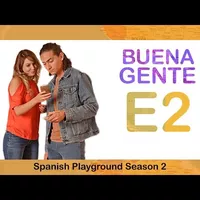Buena Gente S2 E2
Gute Menschen S2 E2
Good People S2 E2
(1) Spanish Shows for Learning Spanish Buena Gente S2 E2 - YouTube
Les bonnes gens S2 E2
Brave persone S2 E2
グッド・ピープル S2 E2
좋은 사람들 S2 E2
Geri žmonės S2 E2
Goede mensen S2 E2
Good People S2 E2
Good People S2 E2
Хорошие люди S2 E2
Bra människor S2 E2
İyi İnsanlar S2 E2
Хороші люди S2 E2
好人 S2 E2
好人 S2 E2
Tres tristes tigres tragaban...
|sad|tigers|were swallowing
|||tragaban
Three sad tigers gulped down…
Ya, por favor
Enough already, please
Lo dices muy bien.
You|say||
you say it very well.
Ya no tienes que practicar más.
||||practice|
Už nemusíte cvičit.
You don’t have to practice any more.
Hola, ¿cómo estás?
Hi, how are you?
Hola. Bien, gracias.
Hi. Fine, thanks.
De verdad, lo dices muy bien.
|truth||say||
Opravdu jste to vystihl velmi dobře.
Really, you say it very well.
Pero quiero mostrarles el día del evento a los estudiantes
||to show them||day||event|||students
Ale chci studentům ukázat den konání akce.
But on the day of the event I want to show the students
cómo se hace rápido.
|||fast
jak se to dělá rychle.
how you say it fast.
Lo dices rápido.
It|say|
You say it fast.
...tragaban trigo en un trigal.
they swallowed|wheat|||wheat field
|trigo|||trigal
gulped down wheat in a wheat field.
Tres tristes tigres tragaban trigo en un trigal.
||tigers|were swallowing|wheat|||wheat field
Tři smutní tygři polykali pšenici na pšeničném poli.
Three sad tigers gulped down wheat in a wheat field.
A ver, explícame algo
|let's|explain to me|something
So, explain something to me.
¿Por qué están tristes los tigres?
||are|||tigers
|||||tigres
Proč jsou tygři smutní?
Why are the tigers sad?
¿Están tristes porque solo tienen trigo?
||||they have|wheat
Jsou smutní, protože mají jen pšenici?
Are they sad because they only have wheat?
Creo que sí
|that|yes
I think so
porque los tigres no comen trigo.
||tigers||eat|wheat
protože tygři pšenici nejedí.
because tigers don’t eat wheat.
Comen, no sé
||know
Oni jedí, já nevím.
They eat, I don’t know
elefantes
elephants
elephants
jirafas
giraffes
giraffes
No sé qué más
|know||
Nevím, co jiného
I don’t know what else
pero no comen trigo
||eat|wheat
but they don’t eat wheat.
de eso estoy segura.
|||sure
Tím jsem si jistý.
I’m sure of that.
Es solo un trabalenguas Sandra
|||tongue twister|Sandra
|||trabalenguas|
Je to jen jazykolam Sandra
It’s only a tongue twister Sandra
no una clase sobre animales que viven en África.
|||about|||||Africa
ne třída o zvířatech žijících v Africe.
not a class on animals that live in Africa.
Por cierto, hablando de animales
|certain|talking||
Mimochodem, když už mluvíme o zvířatech
By the way, speaking of animals
¿atrapamos al ratón?
do we catch||
atrapamos||ratón
did we catch the mouse?
Voy a revisar al cuarto de Mateo.
||to check||||Matthew
||revisar||cuarto||
Jdu zkontrolovat Mateův pokoj.
I’m going to check Mateo’s room.
¿Primo?
Cousin
Bratranec?
Cousin?
¿Qué haces?
|you do
Co to děláte?
What are you doing?
¿Qué pasa?
|happens
Co se děje?
What happened?
Quiero poner la ratonera en el closet,
|to put||mouse trap|||closet
|||ratonera|||
Chci dát past na myši do skříně,
I want to put the mousetrap in the closet
pero la puerta no funciona.
||door||works
ale dveře nefungují.
but the door doesn’t work.
No abre.
|doesn't open
It doesn’t open.
A ver...
Let’s see.
Tienes razón.
You|reason
Máte pravdu.
You’re right.
Seguramente se puede arreglar.
Certainly||can|fix
Jistě to lze napravit.
Surely it can be fixed.
Espero que sí, porque es el closet que va a usar Mateo.
I hope|||||||||a||Matthew
I hope so, because this is the closet that Mateo is going to use.
Ay, hablando de Mateo
Oh|||Matthew
Oh, speaking of Mateo
me acaba de mandar una foto
to me|just||to send||photo
||de|||
he just sent me a photo
de la Pirámide del Sol de Teotihuacán.
||Pyramid||||Teotihuacan
of the Pyramid of the Sun at Teotihuacán.
Mira.
Look.
Qué bonita, ¿no?
How pretty, right?
Mateo dice que llega un día antes.
|says||he/she/it arrives|||before
Mateo says he is arriving a day early.
O sea, el viernes
|is||Friday
So, Friday
no el sábado.
||Saturday
not Saturday.
¿Qué día es hoy?
|day||today
What day is today?
Hoy es...
Today is
jueves.
Thursday
Thursday.
Y llega mañana.
|arrives|morning
And he arrives tomorrow.
¡Y mañana viernes
||Friday
And tomorrow, Friday
es el cumpleaños de Mateo!
||birthday||
is Mateo’s birthday!
¿Y si invitamos a unos amigos?
||we invite|||
Should we invite some friends?
¿Y compramos pastel?
|we buy|cake
And buy a cake?
¡No hay fiesta sin pastel!
There is no party without cake!
Está muy bien.
It is||
That’s great.
Pero…
But
But…
¿y la puerta?
||door
what about the door?
No te preocupes.
||worry
Don’t worry.
A Mateo no le importa la puerta del closet.
||||matters||||
Mateo doesn’t care about the closet door.
Siempre dices eso.
|say|
You always say that.
A Mateo no le importa la puerta, ni el ratón.
||||matters||door|||mouse
Mateo doesn’t care about the door, or the mouse.
Es cierto
It’s true.
Vamos a tener una fiesta y pastel.
||have||||cake
We’re going to have a party and cake.
Voy a ir a la ferretería.
|||||hardware store
|||||ferretería
I’m going to go to the hardware store.
Buenas tardes.
Good afternoon.
Hola.
Hi.
¿Más ratoneras?
|mouse traps
More mousetraps?
Es otro problema.
It’s another problem.
Ahora con una puerta.
|||door
Now with a door.
¿Tiene una perilla como esta?
||doorknob|like|this
||perilla||
Do you have a knob like this?
Las puertas son difíciles de arreglar.
|doors||||fix
Doors are hard to fix.
Pero intenta con esto. Tal vez funcione.
|try|||Such|time|it works
But try with this. Maybe it will work.
¿Cuánto es?
How much is it?
450 pesos.
dollars
450 pesos.
Doscientos
Two hundred
200
Trescientos
Three
300
Cuatrocientos
Four hundred
400
Cincuenta.
Fifty
五十
50.
Muchas gracias.
Thanks a lot.
Que te vaya bien.
||goes|
Have a good day.

